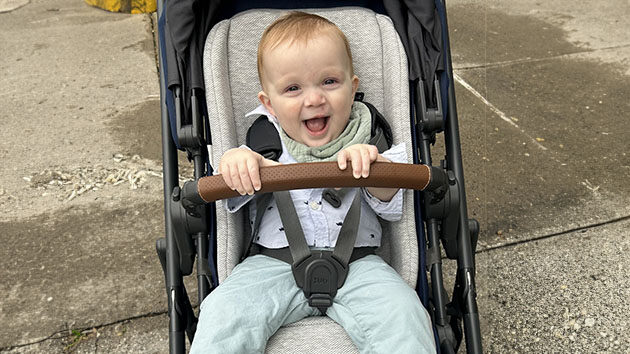The Difference A Year Makes

Young Cleft-Craniofacial Center Patient Thriving After Surgery
Aiden Scott celebrated his first birthday earlier this month at a dinosaur-themed party, enjoying cake and playing with family and friends. It was a happy culmination to an often difficult year.
Aiden was born with a cleft lip and cleft palate. When he was just three months old, he had surgery at Albany Medical Center to repair his lip. Seven months later, he underwent a second surgery for his palate.
“He has healed so well, but before his palate was repaired, we had to be careful with what he ate, as food could get stuck in the palate,” said Aiden’s mom, Kelly McAuley. “Now, he eats everything from graham crackers and yogurt to meatballs, bananas, applesauce, and pancakes.”
July is National Cleft and Craniofacial Awareness and Prevention Month.
Common Congenital Abnormality
According to the CDC, approximately one in 1,050 children is born with a cleft lip, either with or without also having a cleft palate.
Cleft lips and palates occur when the tissues that form the lips and roof of the mouth don’t fuse together as they should, which should occur between the sixth and ninth weeks of pregnancy.
While a cleft lip can be diagnosed before the baby is born, it’s not possible to repair a cleft lip or palate while the baby is in utero, so surgery has to wait until after birth.
Unrepaired cleft lips and palates can lead to a host of issues beyond the cosmetic appearance, including difficulty eating, ear infections and hearing loss, delays in speech and language, and dental problems as the child gets older.
A Surprising Diagnosis
Aiden’s cleft lip was diagnosed at McAuley’s 20-week anatomy scan ultrasound; his soft palate cleft wasn’t confirmed until he was born.
McAuley and her fiancé, Shaun Scott, were caught off guard when they first got the news as they have no family history. “The unknown is very, very scary,” she said. “Then, all of a sudden, we were scheduling a bunch of appointments for an MRI, a fetal echocardiogram, and more.”
They were also referred to plastic and reconstructive surgeon Stephanie Bray, MD, director of the Cleft-Craniofacial Center at Albany Medical Center, the only center of its kind in northeastern New York.
Collaborative, Coordinated Care
The family first met with Dr. Bray before Aiden was born. She explained what his surgeries would entail and also introduced them to the other services available through the Cleft-Craniofacial Center, including ENT specialists and speech and feeding therapy.
“The team is amazing,” said McAuley. “It was very overwhelming at first, but Dr. Bray was great about explaining everything to us, and after meeting with her and the feeding and ENT teams we felt so much better and more prepared.”
“They were so patient with all our questions and concerns. Even after the surgeries as we managed pain, feeding, healing, and finding a new normal each time,” said Scott.
Specialists in dentistry, genetics, neurosurgery, nutrition, orthodontics, social work, and speech/language pathology are also part of the Cleft-Craniofacial Center.
Expert Surgical Solutions
While cleft abnormalities are relatively common, the surgeries to correct them still require a special expertise. Both of Aiden’s surgeries lasted three to four hours and were more involved than simply sewing the separated tissues together.
To repair his cleft lip, Dr. Bray had to reconnect the muscles around his mouth that form the smile, as well as reshape his nose structure – essentially, a rhinoplasty.
“The work she did was incredible,” said Scott. “The way the scars are healing is amazing. If you didn’t know about the surgery, you wouldn’t be able to tell.”
During the palate repair, also performed by Dr. Bray, pediatric otolaryngologist Lara Reichert, MD, simultaneously placed tubes in Aiden’s ears to help prevent ear infections, which are common with cleft patients. They will eventually fall out on their own as Aiden grows.
Reassurance
Today, Aiden is a happy toddler, and McAuley says they couldn’t ask for a better temperament.
“He’s the happiest baby. The only times he gets upset is when he’s hungry or tired,” she said. “He loves a bath, and water, and always wants to splash in the dog’s water bowl. And now that his palate is repaired, he loves to eat.”
The family is also thankful that they didn’t have to travel – with a newborn – outside of the area for Aiden’s care. “We are so lucky to have this level of care here,” she said.
Their advice for other parents who may be facing a similar situation? “Use the resources that are there at the Center.”
“The team was so great at reassuring us, from the diagnosis through the surgeries, and now in his follow-up care, and we want to help reassure others,” McAuley added. “It’s easy to be overwhelmed by everything, but know that it’s all going to be okay, and it’s so worth it.”


